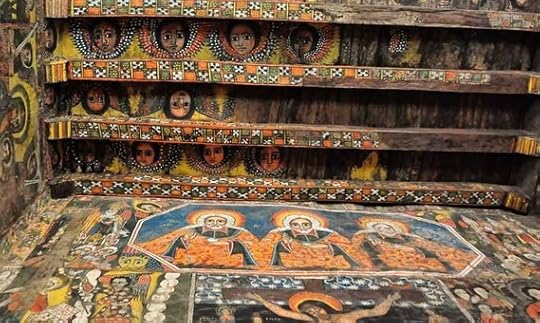Randy Alcorn's Blog, page 103
April 24, 2019
Will We Learn in Heaven?

I heard a pastor say, “There will be no more learning in Heaven.” One writer says that in Heaven, “Activities such as investigation, comprehending and probing will never be necessary. Our understanding will be complete.” [1] In a Gallup poll of people’s perspectives about Heaven, only 18 percent thought people would grow intellectually in Heaven. [2]
Does Scripture indicate that we will learn in Heaven? Yes. Consider Ephesians 2:6-7: “God raised us up with Christ and seated us with him in the heavenly realms in Christ Jesus, in order that in the coming ages he might show the incomparable riches of his grace.” The word show means “to reveal.” The phrase in the coming ages clearly indicates this will be a progressive, ongoing revelation, in which we learn more and more about God’s grace.
I frequently learn new things about my wife, daughters, and closest friends, even though I’ve known them for many years. If I can always be learning something new about finite, limited human beings, surely I’ll learn far more about Jesus. None of us will ever begin to exhaust His depths.
Jesus said to His disciples, “Learn from me” (Matthew 11:29). On the New Earth, we’ll have the privilege of sitting at Jesus’ feet as Mary did, walking with Him over the countryside as His disciples did, always learning from Him. In Heaven we’ll continually learn new things about God, going ever deeper in our understanding.
Consider the Greek words ginosko and epiginosko, translated “know” in 1 Corinthians 13:12, used of our present knowledge on Earth and our future knowledge in Heaven: “For now we see in a mirror dimly, but then face to face. Now I know in part; then I shall know fully, even as I have been fully known.” Ginosko often means “to come to know,” and therefore “to learn” (Matthew 10:26; John 12:9; Acts 17:19; Philippians 2:19). Epiginosko also means “to learn” (Luke 7:37; 23:7; Acts 9:30; 22:29). [3] That we will one day “know fully” could well be understood as “we will always keep on learning.”
It was God—not Satan—who made us learners. God doesn’t want us to stop learning. What He wants to stop is what prevents us from learning.
Puritan preacher Jonathan Edwards, who intensely studied Heaven, believed “the saints will be progressive in knowledge to all eternity.” [4] He added, “The number of ideas of the saints shall increase to eternity.” [5]
Will our knowledge and skills vary? Will some people in Heaven have greater knowledge and specialized abilities than others? Why not? Scripture never teaches sameness in Heaven. We will be individuals, each with our own memories and God-given gifts. Some of our knowledge will overlap, but not all. I’m not a mechanic or gardener, as you may be. I may or may not learn those skills on the New Earth. But even if I do, that doesn’t mean I’ll ever be as skilled a gardener or mechanic as you will be. After all, you had a head start on learning. The doctrine of continuity means that what we learn here carries over after death.
Don’t you love to discover something new? On the New Earth, some of our greatest discoveries may relate to the lives we’re living right now. Columnist and commentator Paul Harvey made a career of telling “the rest of the story.” That’s exactly what we’ll discover in Heaven again and again—the rest of the story. We’ll be stunned to learn how God orchestrated the events of our lives to influence people we may have forgotten about.
Occasionally we hear stories that provide us a small taste of what we’ll learn in eternity. One morning after I spoke at a church, a young woman came up to me and asked, “Do you remember a young man sitting next to you on a plane headed to college? You gave him your novel Deadline.” I give away a lot of my books on planes, but after some prompting, I remembered him. He was an unbeliever. We talked about Jesus, and I gave him the book and prayed for him as we got off the plane.
I was amazed when the young woman said to me, “He told me he never contacted you, so you wouldn’t know what happened. He got to college, checked into the dorm, sat down, and read your book. When he was done, he confessed his sins and gave his life to Jesus. And I can honestly tell you, he’s the most dynamic Christian I’ve ever met.”
All I did was talk a little, give him a book, and pray for him. But if the young woman hadn’t told me, I wouldn’t have had a clue what had happened. That story reminded me how many great stories await us in Heaven and how many we may not hear until we’ve been there a long time. We won’t ever know everything, and even what we will know, we won’t know all at once. We’ll be learners, forever. Few things excite me more than that.
From Eternal Perspective Ministries: Heaven Book Sale
“[This book] gives a biblical foundation for insight on the new world. If you are a Christian and worried about the afterlife, you will no longer be worried. What a blessing this book has been. I have read it twice, and my husband has read it four times. We have given it to many people as a gift. Thank you Randy Alcorn for writing it.” –Amazon review
Heaven is on sale from EPM for $9 (65% off $25.99 retail), plus S&H. Sale ends Thursday, April 25 at 12 p.m. PT.
[1] Dave Hunt, Whatever Happened to Heaven? (Eugene, Ore.: Harvest House, 1988), 238.
[2] Colleen McDannell and Bernhard Lang, Heaven: A History (New York: Vintage Books, 1988), 307.
[3] Kittel et al., Theological Dictionary, 1:703.
[4] Jonathan Edwards, The Works of Jonathan Edwards, ed. Perry Miller, vol. 13, The Miscellanies, ed. Thomas A. Schafer (New Haven, Conn.: Yale University Press, 1994), 483.
[5] Ibid., 275; I’m indebted to Andrew McClellan for several citations from his seminary paper “Jonathan Edwards’s View of Heaven,”August 15, 2003.
Photo by Clay Banks on Unsplash
April 22, 2019
20 Years after Columbine, and Thoughts from Darrell Scott, Father of Rachel Joy Scott, on Preparing for Suffering

Last Saturday, April 20, was the 20th anniversary of the shooting at Columbine High School. Like many of us, I vividly remember the shock as the events unfolded.
As part of my research for my book If God Is Good, I interviewed and exchanged correspondence with many people who shared their stories and perspectives. One of those people was Darrell Scott, whose daughter Rachel Joy Scott was the first person killed at Columbine.
When Darrell looked back at his daughter’s murder, he said that years before, God had prepared him. He’d read Norman Grubb’s writings about the eye of faith that allows us to see through our worst circumstances to God’s purpose. Most people, Darrell told me, are look-atters. We should learn to become see-throughers.
Because Darrell had learned to think this way, he could, despite his incredible pain, see through Rachel’s death to a sovereign, purposeful God. Simply looking at the horror and apparent senselessness of Columbine would have paralyzed him, while seeing through it prompted him before God to carry on Rachel’s heart of ministry in reaching out to others.
Darrell’s view of God already had a firm place in his heart when Rachel died. He trusted from the first that God had a purpose in her death. While this did not remove his pain, it did provide solid footing from which he could move forward, trusting God instead of resenting Him.
I asked Darrell what we should do to prepare for evil and suffering. Without hesitation he said, “Become a student of God’s Word.”
He added, “Don’t be content to be hand-fed by others. Do your own reading and study, devour good books, talk about the things of God.”
When suffering and evil come our way, they’ll exert a force that either pushes us away from God or pulls us toward Him. The perspectives we’ve cultivated between now and then will determine our direction. In my experience, most Christians lack grounding in God’s attributes, including His sovereignty, omnipotence, omniscience, justice, and patience. We dare not wait for the time of crisis to learn perspective! The time to study these things in the Bible is now.
Now is the time to contemplate these words of God about the future that awaits us:
Now the dwelling of God is with men, and he will live with them. They will be his people, and God himself will be with them and be their God. He will wipe every tear from their eyes. There will be no more death or mourning or crying or pain, for the old order of things has passed away. He who was seated on the throne said, “I am making everything new!” (Revelation 21:3–5)
Browse more resources on the topic of suffering, and see Randy’s related books, including The Goodness of God.
Photo by Josh Applegate on Unsplash
April 19, 2019
The Agony of Jesus on Good Friday, and His Triumph on Easter Sunday

I’d like to share some thoughts that might help put Good Friday and Easter Sunday in eternal perspective.
“Carrying his own cross, he went out to the place of the Skull (which in Aramaic is called Golgotha). There they crucified him, and with him two others—one on each side and Jesus in the middle” (John 19:17–18, NIV).
Today is “Good Friday,” commemorating the crucifixion of Jesus. But that torturous death of God’s Son was the single most horrible injustice in human history. So WHY do we call it Good? Why not call it Bad Friday or Horrific Friday?
Because out of the appallingly bad came what was inexpressibly good. And the good trumps the bad because the bad was temporary while the good is eternal. God’s love and grace come to us soaked in divine blood.
The Cross is God’s answer to the question, “Why don’t you do something about evil?” God did do something…something unimaginably great and powerful. One look at Jesus—at His incarnation and the redemption He accomplished for us—should silence the argument that God has withdrawn to some far corner of the universe where He keeps His hands clean and maintains His distance from human suffering. God does not merely empathize with our sufferings. He actually suffers. Jesus is God. What Jesus suffered, God suffered.
A powerful moment in the movie The Passion of the Christ occurs when Jesus, overwhelmed with pain and exhaustion, lies on the ground as guards kick, mock, and spit on Him. A horrified woman, her hand outstretched, pleads, “Someone, stop this!” The great irony is that Someone, God’s Son, was doing something unspeakably great that required it not be stopped. Had someone delivered Jesus from His suffering that day, He could not have delivered us from ours.
The Gospel accounts of the Crucifixion and Resurrection depict Christ’s deep unhappiness in Gethsemane and His anticipation of the Cross. Joy and happiness are overshadowed by sorrow and grief—until the release of death. What follows for Jesus is joy, but for the apostles it is overwhelming grief. Resurrection happiness soon shines its light, pushing sorrow into the shadows. Death is conquered, and our eternal happiness secured.
What would otherwise have been remembered as Terrible Friday is transformed into Good Friday because Christ’s resurrection works in reverse upon death. The hidden purpose in Christ’s suffering is no longer hidden—it becomes a spectacular cause for happiness. This is the gospel’s Good News! In the end, life conquers death, joy triumphs over suffering. Happiness, not sorrow, has the last word—and it will have the last word forever.
This secure future invades our present, so that even while death and sorrow remain, the new normal in Christ isn’t sorrow but happiness. As Easter worked in reverse to make Good Friday good, so our resurrection will work in reverse to bring goodness out of our most difficult days. Faith is a sort of forward memory in which we trust God’s promise of eternal happiness and experience a foretaste of that happiness in severe difficulty.
Have a wonderful Easter weekend with your families, realizing that every joy you experience now and ever will comes out of both the agony of Jesus on Good Friday and the triumph of Jesus on Easter Sunday. And every hardship you experience is something Jesus died to work together for your eternal good.
For more on Jesus and His death and resurrection, see Randy's devotional Face to Face with Jesus. For more perspectives on evil and suffering, see his blog articles and his books If God Is Good and 90 Days of God's Goodness.
Photo by Ben White on Christianpics.co
April 17, 2019
David Powlison on the Incalculably Powerful Gentleness of Jesus

I’ve highly recommended David Powlison’s outstanding book Good and Angry: Redeeming Anger, Irritation, Complaining, and Bitterness. This book reflects a big view of God, and I personally benefited from it. In this excerpt, David talks about the gentleness of Jesus, and how it’s been commonly misunderstood as a weakness, rather than a demonstration of God’s strength.
As I write in my book Face to Face with Jesus, “The gentle, compassionate Jesus is also the Jesus who drove the merchant-thieves from the temple and spoke condemnation against self-righteous religious leaders. His less popular qualities so outraged people that they nailed him to a cross. We should believe all that Scripture says about Jesus—whether or not it makes sense to our finite little minds.” —Randy Alcorn
The English language has no full-orbed equivalent for the word translated as gentleness. Jesus exhibited this trait so remarkably that its fragrance and coloration marked his entire life. Here walked the Lord of glory among his own people. Every human being that Jesus met owed him life and utter loyalty. This is the LORD, to whom temple sacrifices were offered in repentance and gratitude. Yet most of these people ignored Jesus, misunderstood him, tried to use him, reviled him, and plotted against him. Even his own intimate followers, who basically loved him, repeatedly proved themselves dense as stones. How did he put up with it for thirty-three years? Gentleness. He was utterly mastered by merciful purposes.
Jesus dealt gently with the ignorant and misguided, even when he suffered at their hands. Such meekness is incalculably powerful. It is a virtue almost beyond our imagination, the ability to endure injury with patience and without resentment. I have known several people who demonstrated the firstfruits of this virtue. Their lives showed hints of radiance, a glimpse of the unveiled glory of Jesus, the loveliest thing I’ve ever seen. They were purposefully constructive in the most difficult circumstances.
We can understand to a degree that Jesus was compassionate toward sufferers. But when we consider that the Christ’s master purpose was self-sacrificing mercy for his enemies, here the gentleness of Jesus exceeds comprehension. George MacDonald captured the essence of such gentleness this way: “It’s a painful thing to be misjudged. But it’s no more than God puts up with every hour of the day. But he is patient. So long as he knows he’s in the right, he lets folk thing what they like—‘til he has time to make them know better. Lord, make my heart clean within me, and then I’ll care little for any judgment but yours!”
It’s unfortunate that “gentle Jesus, meek and mild” has become a picture of someone weak and ineffectual, a sentimental, pablum savior, good for children, but not good enough for grown-ups. May the God of the Lord Jesus Christ give us his true gentleness. Such strength is a royal attribute.
April 15, 2019
You Can Claim to Follow Jesus, But Miss the Point of Who He Is

Most readers of this blog are followers of Jesus. But what do we really believe about the Jesus we follow? Is the Jesus we claim to know the real Jesus, or a Jesus of our own invention, who doesn’t match up with the biblical and historical realities?
There are a lot of people, friends, coworkers and extended family members who say they “believe in Jesus.” But what’s more important is what they actually believe about the Jesus they say they worship and follow.
For instance, Jehovah’s Witnesses “believe in Jesus,” but they don’t believe that Jesus was God. If Jesus was and is God, then they don’t actually believe in the true Jesus. It’s the same with Mormons and countless others who respect and even elevate Jesus, but don’t believe He’s the utterly unique Son of God who is in fact God Himself.
How important is to believe that Jesus wasn’t just a great man and a great example, but is actually God? John MacArthur says, “That Jesus is himself God is the heart of the gospel, because apart from his deity he could not save a single soul.” Scripture says, “No one who denies the Son has the Father; he who confesses the Son has the Father as well” (1 John 2:23).
Jesus’ declaration “Before Abraham was born, I am!” (John 8:58) was a direct claim to be Yahweh, the God whose name is “I am who I am” (Exodus 3:14). We know those who heard Him understood exactly what He was claiming, because “they picked up stones to stone him” (John 8:59).
In John’s Gospel, Jesus makes more “I am” statements affirming His deity. The God-man said, “I am the bread of life” (John 6:35,48,51); “I am the light of the world” (John 8:12; 9:5); “I am the gate” (John 10:9); “I am the good shepherd” (John 10:11,14); “I am the resurrection and the life” (John 11:25-26); “I am the way and the truth and the life” (John 14:6); and “I am the vine” (John 15:5).
Jesus, who always was, is the eternal “I am.” “For the entire fullness of God’s nature dwells bodily in Christ…the head over every ruler and authority” (Colossians 2:9-10, CSB).
If we get it right about Jesus we can afford to get some things wrong. If we get it wrong about Jesus, it won’t matter that we got a lot of other things right.
Here are some good resources for further thought:
Does the Bible teach the deity of Christ?
Good article from BibleGateway on Christ being God
11 Reasons to Affirm the Deity of Christ
For more on Jesus, see Randy’s book Face to Face with Jesus: Seeing Him as He Really Is.
April 12, 2019
John Piper on the Apostle Paul, Suffering, and the Groaning of a Fallen World

I love the apostle Paul, I love his God-breathed words in Scripture, and I love what he understood and said about suffering. And I love John Piper too—so it was a no brainer to feature this excellent article, excerpted from John’s new book Why I Love the Apostle Paul. —Randy Alcorn
The Whole Creation Groans in Every Grief: Why I Love the Apostle Paul
By John Piper
Only rarely do we find a person who is able to speak meaningfully about suffering at the very personal level of pain and loss, and also at the cosmic level of why the whole universe is the way it is. Most people, it seems, are wired either to be a wise counselor who can apply God’s goodness and power to individual need or to think globally about why the entire world is permeated, for all its beauty, with horrifying calamities. Finding both in one person is rare and beautiful. The apostle Paul was such a person.
Paul was not naïve about the vastness of human misery and suffering in the world. And the explanation he gave, as he probed this mystery, was both personal in its application to individual Christians and cosmic in its scope of redemption.
Destined to Suffer
Within weeks after starting a new church and appointing leaders for the church, Paul prepared the new believers to suffer.
When they had preached the gospel . . . they returned to Lystra and to Iconium and to Antioch, strengthening the souls of the disciples, encouraging them to continue in the faith, and saying that through many tribulations we must enter the kingdom of God. (Acts 14:21–22)
Paul did not try to soften the claims that Jesus put on his followers. He did not use a bait-and-switch tactic by luring people with the promise of prosperity and then changing his tune when trouble arrived. He said plainly, “All who desire to live a godly life in Christ Jesus will be persecuted” (2 Timothy 3:12).
When tribulation began, he reminded the believers that they were not entering something unusual. They were not being singled out because of some sin. They were experiencing what God had ordained for his beloved children. So he urged them not to be “moved by these afflictions. For you yourselves know that we are destined for this” (1 Thessalonians 3:3).
Paul’s Personal Empathy
Paul helped people see their suffering through the lens of God’s good purposes for their eternal good:
We ourselves boast about you in the churches of God for your steadfastness and faith in all your persecutions and in the afflictions that you are enduring. This is evidence of the righteous judgment of God, that you may be considered worthy of the kingdom of God, for which you are also suffering. (2 Thessalonians 1:4–5)
Paul helped individual Christians not just in the pain of persecution but in all their sufferings, whether disease or accident or loss or the ordinary burdens of life. He explained that the whole creation is groaning under futility caused by the fall (Romans 8:22), and then he added that Christians are not exempt from this groaning:
We know that the whole creation has been groaning together in the pains of childbirth until now. And not only the creation, but we ourselves, who have the firstfruits of the Spirit, groan inwardly as we wait eagerly for adoption as sons, the redemption of our bodies. (Romans 8:22–23)
In other words, Christians endure groans of almost every kind in this world until Christ comes to redeem our bodies. Life in the body — life in this fallen world — means groaning. So take heart, if you are trusting in Christ. Your suffering is not owing to God’s wrath against you. Your condemnation for sin has been taken away by the death of Christ (Romans 8:1). God will not let you be tested beyond what he gives you the grace to bear (1 Corinthians 10:13; 2 Corinthians 9:8). Your groaning is limited. Redemption is coming. “Weeping may tarry for the night, but joy comes with the morning” (Psalm 30:5).
Paul’s Global Vision
Amazingly, Paul is eager not only to help us individually, with our personal suffering in the moment, but also with the big picture of why the whole creation is in such a mess. Here is the key passage from his great letter to the Romans:
The creation was subjected to futility, not willingly, but because of him who subjected it, in hope that the creation itself will be set free from its bondage to corruption and obtain the freedom of the glory of the children of God. For we know that the whole creation has been groaning together in the pains of childbirth until now. (Romans 8:20–22)
This subjection of the creation to futility is a reference to God’s act in the garden of Eden, after Adam and Eve turned away from God’s goodness and wisdom and authority. God did what he said he would do (Genesis 2:17): he introduced death into the world and put creation under bondage to corruption and pervasive futility.
In other words, God’s judgment upon the sin of human rebellion was the breakdown of nature’s beautiful functioning. Now things go wrong. Corruption and futility are shot through the created order with every manner of suffering and dying.
A Picture of Sin’s Evil
We can shed some light on God’s purpose in this subjection of creation if we ask, Why would God’s judgment fall on physical creation when the sin was an act of the human heart? My answer is that the physical miseries of the creation are a visible and deeply felt witness to the moral ugliness and outrage of sin.
For most of us, the sins of our hearts (our preference for God’s gifts over God himself) do not cause great agony of soul. We do not feel the real outrage of the universe — namely, that the beautiful Creator and sustainer of the world is disregarded and dishonored. But just let our bodies be touched by pain, and we are full of indignation that this is happening.
In other words, God subjected the physical world to corruption to show us the outrage of sin at the one point where we really feel it. All physical pain and sorrow should scream at us, “This is how horrible sin is.” This is how serious our moral condition is before God. This is why the redemption of the world was not cheap, but cost the infinite price of the Son of God dying for sinners.
For Your Comfort
It is beautiful and rare when a person can offer a global explanation for suffering, and then also make his own very personal suffering a means of our comfort. But Paul has done this for me many times. He wanted it this way:
If we are afflicted, it is for your comfort and salvation; and if we are comforted, it is for your comfort, which you experience when you patiently endure the same sufferings that we suffer. (2 Corinthians 1:6)
I take this very personally. I love him for the vastness of his global vision. And I love him for turning his own suffering into a means of my comfort.
By John Piper. © Desiring God Foundation. Source: desiringGod.org
For more, see John’s book Why I Love the Apostle Paul. And if you’d like to study Paul’s life, I recommend first reading or listening to the book of Acts and letters of Paul. If you want a quick illustrated read on the apostle Paul, see my graphic novel The Apostle. I spent a lot of time studying his life to write it, and chose many of the great action scenes in Acts and added some scenes to tie it together. Or if you want a serious biography, The Apostle: A Life of Paul is a classic. —Randy Alcorn
Photo by Grant Ritchie on Unsplash
April 10, 2019
My Heaven Booklet, and Ideas for How to Use It to Share the Gospel

I’ve been greatly encouraged by the responses to the little 60-page Heaven booklet, which contains a sampling of the questions and answers found in my Heaven book. Heaven has reached over one million copies sold, and this small, affordable booklet has sold over 1,500,000. I never would have guessed it of either! (Here’s a short excerpt from the booklet.)
The Heaven booklet has been widely distributed at memorial services. Some churches, including my own, make it available at every memorial service. Sometimes it’s handed out at the door; sometimes it’s placed on the seats or pews.
Many people, including myself, also regularly give away booklets. It doesn’t take much effort, and when it does, it’s more than worth it. I leave them with servers at restaurants (always with a tip that's 20% or more), give them to people on planes, and have them on me for checkers at stores. In some cases, we won’t be in a position to follow up and may not see the person again in this life. But consider that one day, in the presence of Christ, you may have a person who read the booklet and came to faith in Christ, or were strengthened in their faith, say to you, “Thank you for giving me that booklet—God used it powerfully in my life!”
Here are some of the notes we’ve received from readers over the years. Their ideas for sharing booklets may inspire you:
Our 22-year-old son passed away a few months ago suddenly from a stroke. I have given out many Heaven booklets to his friends. I write in the booklet that I appreciate their love and care after our son's passing, and that I am sure they would like to read about where he is today. Then I pray as I share the booklet with them. It is then God's job to work on their hearts, not mine. The booklet is written so simply and gives the "message" in such tactful ways. When I give the booklet to a person I know is a Christian, I ask them to read it and then pray about who to pass it along to who is not a Christian. This helps to make sure that the person I thought was a Christian really is, and then the additional benefit when it is passed along to others. —B.
I always have a few Heaven booklets with me wherever I go. …While I was waiting for my number to be called [at the DMV], I offered one to the gal sitting next to me. I was surprised when she said, “I already have one”! We had a great conversation while we waited, she said she knew all about Randy Alcorn and his ministry, and had read many of his other books. So… since this woman I asked already had a Heaven Booklet, I gave them to the DMV worker who helped me instead, and he gave one to his coworker at the next station! —D.T.
I gave some Heaven booklets in gift bags with chocolate to my neighbors this Christmas. It fills me with joy that I can use these booklets this way! At least one of my neighbors is not a believer, so I prayed over the bags before they went out. —M.G.
Our church will be giving out food baskets at Easter, and we plan on giving each recipient one of the booklets. If it has as much impact on those receiving the booklets as the book did on my Sunday school class, we will have a revival in this city. —Anonymous
I work in a medical office and regularly order Heaven booklets to keep in the office for patients to read or take. Each morning I make sure there are three Heaven booklets in each exam room, along with the other reading materials, hoping people will take them to read. I purchased 200 four months ago, and they are almost all gone already and I'm ordering 200 more!—S.L.
God laid a new idea on my heart the other day when I passed a homeless guy with a sign: to buy $5 gift cards to McDonalds, etc. and put them in the Heaven booklet along with the “How Can We Know We’re Going to Heaven?” tract and give them to them. …Now I look forward to seeing someone with a sign instead of dreading and avoiding them! —C.Z.
Recently I used the Heaven booklet in an English fellowship class with Chinese ladies. We started with the last chapter, "How can we know for sure that we'll go to heaven?" We read, translated, and discussed. It was a perfect way to make the gospel clear. They each had a booklet to take home and one to share if they wanted an extra. —M.W.
My elderly mother has been in a nursing home for about a year. She has been sharing Heaven booklets with visitors and staff for almost as long. I had purchased 100 booklets to send with sympathy cards and filled a wicker basket with Heaven booklets for her to keep on her night stand. Many people are curious about the books and most are delighted to take one home with them. Nursing homes are excellent mission fields! —A.B.
I have really enjoyed passing out the Heaven booklet and the tracts. It makes spreading God's love easier. I own a small landscaping business and have several aging monthly customers whom I really care about. It has been very meaningful to give them the Heaven booklets, as I have been praying for them for years. —M.F.
Someone suggested to me using the Heaven booklet as a tract. A friend and I took them as we travelled by car to Pennsylvania for a funeral, and we have been using them for years now. Only once has someone rejected my offer. These beautiful little booklets are planted all over the country. —M.W.
Heaven Booklets Sale from EPMDon't miss our lowest price of the year on the 20-pack of Randy Alcorn's Heaven booklets! They're ideal for church giveaways, grief support group members, or individual gifting to a loved one. For a limited time, the 20-packs packs are $15 each (62% off $39.80 retail).
Sale ends Thursday, April 11 at 12 p.m. PT.
April 8, 2019
The Rich History of the Early African Church

In my novel Dominion, I picture one of the characters, Dani, who is in Heaven, learning about the history of the black church. It’s a rich history, one that I think we all should celebrate. It was fascinating to study these things as I spent a few years researching that novel.
I hope you find this interesting:
Zeke and Torel left Dani alone to observe through the time portal a great ancient civilization in northern Africa, near modern Sudan. She viewed with fascination the coal black people who called themselves Kushites, whom the Greeks called Ethiopians, which meant “dark skinned.” She watched them develop their own alphabetic language, build pyramids, masonries, ironworks, and complex waterways. She marveled at their excellence in architecture, education, and the fine arts. They were one of the most vigorous and advanced civilizations the world had ever known. Suddenly she saw the writing of the psalmist, and it thrilled her: “Ethiopia shall soon stretch out her hands unto God.”
She watched as Jeremiah was rescued by a black African, then as Simon—from Cyrene in Africa—carried the cross of Jesus. By the time of Christ, this black people group was sending ambassadors to Arabia, India, China, and to Rome. She saw a number of Africans gathered on the day of Pentecost, converted to faith in Christ. She saw the church at Antioch, among the chief leaders Simeon, called “Black Man,” and Lucius the Cyrenian. She watched the Antioch church send out Paul and Barnabas to evangelize Turkey, Greece, and Italy. It inspired her to see black church leaders sending missionaries to reach pagan white Europeans with the gospel. She wished Harley could see this. She wished she’d learned about it back in the Shadowlands.
She watched, intrigued, as one man came to the fore in this ancient drama, a man born just before Christ. He was the chief officer in charge of Ethiopia’s treasury.
Something inside this man—Dani recognized it as the voice of Elyon—told him there was more than the petty ethnic-centered gods of races and nations, such as the three-faced Kushite lion or the Egyptian ram god. There must be a true God who made all races and nations and reigned over all. This Ethiopian sought to know that one true God. He’d heard of a God who brought justice and redemption to a band of slaves, delivering them from the Egyptians a millennium and a half earlier. This was a God who could not be manipulated, who did not exist to fulfill the agenda of any man or nation.
The Ethiopian welcomed the opportunity to travel to Jerusalem. After a few weeks of observing Jewish worship and faith, he began his long journey back by carriage through the Sinai desert to Egypt, from which he would travel another eight hundred miles to his home. Along the way he studied the Hebrew Scriptures, of which he had obtained a scribal copy for his queen at great price. As Dani watched him riding in his chariot, she felt the longing, the ache in his heart to know the truth. It thrilled her.
Suddenly a man appeared on the scene, Philip, a Jewish Christian convert. He had already gone to reach the Samaritans, who had been hated as half-breeds but whom he knew should be embraced because all racial barriers had been broken down in Christ. Now, sent by God’s Spirit, he went to the Ethiopian.
Dani listened as the black African asked questions, and Philip, the brown Jew, explained how God’s Son had suffered and died and risen for all men that they might be forgiven of their sins and spend eternity with him, along with brothers from all nations and tribes and languages.
The Ethiopian listened in rapt attention, sensing this was the missing piece to life’s puzzle. The man came to faith in Christ as he sat in his chariot. He asked Philip to baptize him in water by the road. Dani wept at the sight of this baptism, feeling as if she were there. It moved her more than any she’d ever witnessed.
Dani watched in excitement as this black national leader continued to study and grow in his faith on the journey home. Back in Ethiopia he became an outspoken witness for Elyon’s Son. She watched many in that nation come to Christ, knowing the descendants of these people would migrate to west Africa and seventeen hundred years later many would be taken to the new world as slaves. She realized her roots for the first time—she and her family were descended from the very Ethiopians she now observed. Churches were established, thriving churches. She watched the decades become centuries as some of the greatest theological minds of early Christianity—including Augustine and Tertullian—came out of the black churches of North Africa.
As she watched the courage and conviction of the first African Christians, the strongest bulwark of early Christianity, she swelled with wonder and the right kind of pride. The spiritual heritage of her people, she realized for the first time, did not simply go back a few hundred years to American slaves. Many people of her race embraced the Christian faith before the first white churches were born, before the gospel traveled north to Europe or spread to Asia, and fifteen hundred years before it came to the new world.
She marveled too, as she followed the timeline of history, that the Christian church was solidly grounded in North Africa over six hundred years before Mohammed lived and Islam began. She watched the flourishing ministries of over five hundred bishops in the African church, then grieved as she witnessed Islam’s military conquest and persecution of African Christians. She wondered why she had never before heard this part of history. But she thrilled at the vibrant Christian faith and perseverance of her ancestors, even amid the suffering and enslavement by Muslims.
Dani wept at length, feeling pain eclipsed by joy. Finally she felt a hand on her shoulder. Thinking it might be Elyon’s Son, she peered up at the broad smile of a coal black face she immediately recognized. It was the Ethiopian man, baptized by Philip, now in the full-time service of the King of the universe. Dani and the man walked and talked and exchanged stories. He introduced her to many of his family and old friends, who became her new ones.
If you’d like to read more about the early African church, check out this issue of Christian History, one of my favorite magazines of all time (all 100 issues are on my shelf!).
Photo by Rod Waddington [CC BY-SA 2.0], via Wikimedia Commons
April 5, 2019
Is Death a Taboo Subject for You, Or Are You Preparing for Life’s Greatest Certainty?

There’s an old story of a slave who travels with his master toBaghdad. Early one morning, milling through the marketplace, the slave sees Death in human form. Death gives him a threatening look, and the slave recoils in terror, convinced Death intends to take him that day.
The slave runs to his master and says, “Help me! I’ve seen Death, and his threatening look tells me he intends to take my life this very day. I must escape him. Please let me leave now and flee on my camel so tonight I can reachSamarra, where Death cannot find me.”
His master agrees, and the terrified servant takes off on the fifteen-hour journey toSamarra.
A few hours later, the master himself sees Death among the throngs inBaghdad. He boldly approaches Death and asks him, “Why did you give my servant a threatening look?”
“That was not a threatening look,” Death replies. “That was a look of surprise. You see, I was amazed to see your servant today inBaghdad, for I have an appointment with him tonight inSamarra.”
While the imagery is pagan, the central moral of the story is biblical. “No man has power over the wind to contain it; so no one has power over the day of his death” (Ecclesiastes 8:8).
The time of our death is unknown to us. But the fact of our death is inescapable. We may spend our lives running from death and denying death, but that won’t stop death from coming at its appointed time.
As human beings, we have a terminal disease called mortality. The current death rate is 100 percent. Unless Christ returns soon, we’re all going to die. We don’t like to think about death; yet, worldwide, 3 people die every second, 180 every minute, and nearly 11,000 every hour. If the Bible is right about what happens to us after death, it means that more than 250,000 people every day go either to Heaven or Hell.
In his book Remember Death: The Surprising Path to Living Hope, Matthew McCullough writes this about the taboo of death in our culture:
When is the last time you heard a sermon about death, or heard the subject raised in a small group or a Sunday school class? We don’t talk about death anymore. Why not?
Geoffrey Gorer, an English sociologist, was among the first to examine this roping off of death from polite conversation. In a groundbreaking essay called “The Pornography of Death,” Gorer draws a telling analogy between the place of sex in the nineteenth century and the place of death in the twentieth century. Even as the prominence of sex has broadened—in conversation, in a mainstream television, in what kids are allowed to see and know—death has been shoved out of sight and out of mind.
In the 1870s, when death was everywhere, it would have been embarrassing to bring up sex at a dinner party. It would have been shameful to admit you think much about sex. It would have been irresponsible to talk to your kids about sex. But by the late 1950s, when Gorer wrote, the taboo had shifted. Death had already become in the twentieth century what sex has been to the nineteenth century. In the nineteenth century adults told children that babies came when storks dropped them at the front door. Those same children stood bedside as their loved ones died. Now kids learn that grandpa’s death means he’s gone to a place where he can play golf or go fishing all day. Meanwhile, kids have 24/7 access to sexual content in their Instagram feeds.
How about you? Have you and your family talked about the certainty of your deaths, and how that should impact your lives now? Not talking about death won’t postpone it a moment. Talking about death won’t bring it a moment sooner. But it will give us opportunity to be better prepared when it comes.
David said, “Show me, O Lord, my life’s end and the number of my days; let me know how fleeting is my life. You have made my days a mere handbreadth; the span of my years is as nothing before you. Each man’s life is but a breath” (Psalm 39:4-5). Picture a single breath escaping your mouth on a cold day and dissipating into the air. Such is the brevity of life here. The wise will consider what awaits us on the other side of this life that so quickly ends.
Since life’s greatest certainty is death, it only makes sense to prepare for what lies beyond this life. Any life that leaves us unprepared for death is a foolish life. Matthew Henry put it this way: “It ought to be the business of every day to prepare for our last day.”
For more on the subject of death and eternity, see Randy’s books In Light of Eternity and Heaven. For inspiring quotations about death and resurrection and Heaven, see Eternal Perspectives.
Photo by Mayron Oliveira on Unsplash
April 3, 2019
Redefining Jesus to Meet Our Expectations and Our Culture’s Preferences

The following is an excerpt from The Knowing Jesus Study Bible, edited by Edward Hindson and Ed Dobson. I hope this might encourage us to consider where at times we too might be like Peter, who attempted to fit Jesus within “the parameters of his own expectations.”
As I write in my book Face to Face with Jesus, many today try to reinvent Jesus to fit popular notions of the kind of Christ people want. But Jesus is notoriously uncooperative with all attempts to repackage and market Him. May we worship and serve the Son of God, never attempting to redefine Him, but instead faithfully representing Him in all His fullness to a needy world. —Randy Alcorn
“Who Do You Say I Am?
During Jesus’ earthly ministry there was much discussion about who he really was. Some people surmised that he was John the Baptist come back to life. Others conjectured that he was Elijah, Jeremiah or one of the other prophets (Matthew 16:14). But Jesus was primarily concerned about what his own disciples thought. Peter’s confession was immediate and emphatic: ‘You are the Christ, the Son of the living God’ (verse 16).
Peter actually professed two separate truths about Jesus’ identity. First, he is the Christ, God’s promised Messiah, the anointed One sent by God to be our prophet, priest and king. But Peter further declared that Jesus is the Son of God.
Peter was characterized by his impetuous actions and outbursts and frequently spoke what was on his mind without sufficient forethought. In this instance, however, he is to be applauded for his insightful statement of faith. But before we cheer too loudly, we must look ahead at the ensuing event.
Shortly after this conversation Jesus began preparing his disciples for his coming death (verse 21). These words did not sit well with Peter, and he spoke out in rebuke ‘Never, Lord! …This shall never happen to you!’ (verse 22). Peter understood who Jesus was but failed utterly to grasp the nature of his mission, assuming that, because Jesus was the Messiah, he had come to establish an earthly kingdom and to overthrow the Roman government. Peter was right about who Jesus was but wrong about why he had come.
And the issue was critical—critical enough for Jesus to respond to Peter with uncharacteristic harshness. If Jesus were not to die in accordance with his Father’s plan, then Satan would win the victory in the battle for the human soul and destiny, and Peter was in effect voicing Satan’s opinion!
Peter had structured his conception of Jesus to fit within the parameters of his own expectations. The consummate man of action wanted a king and a kingdom—not death and apparent defeat. We often do the same thing. We are quick to confess that Jesus is the Son of God, but then we proceed to try to force him into the misshapen opening that represents our own image, perspectives and needs.
Our human nature wants to make Jesus Christ palatable to our modern culture rather than allowing him to shine forth before the world as a crucified and risen Savior. But when we redefine Jesus, we do the work of Satan. At that point we, like Peter, understand neither our leader nor our enemy.
Photo by Ben White on Christianpics.co



